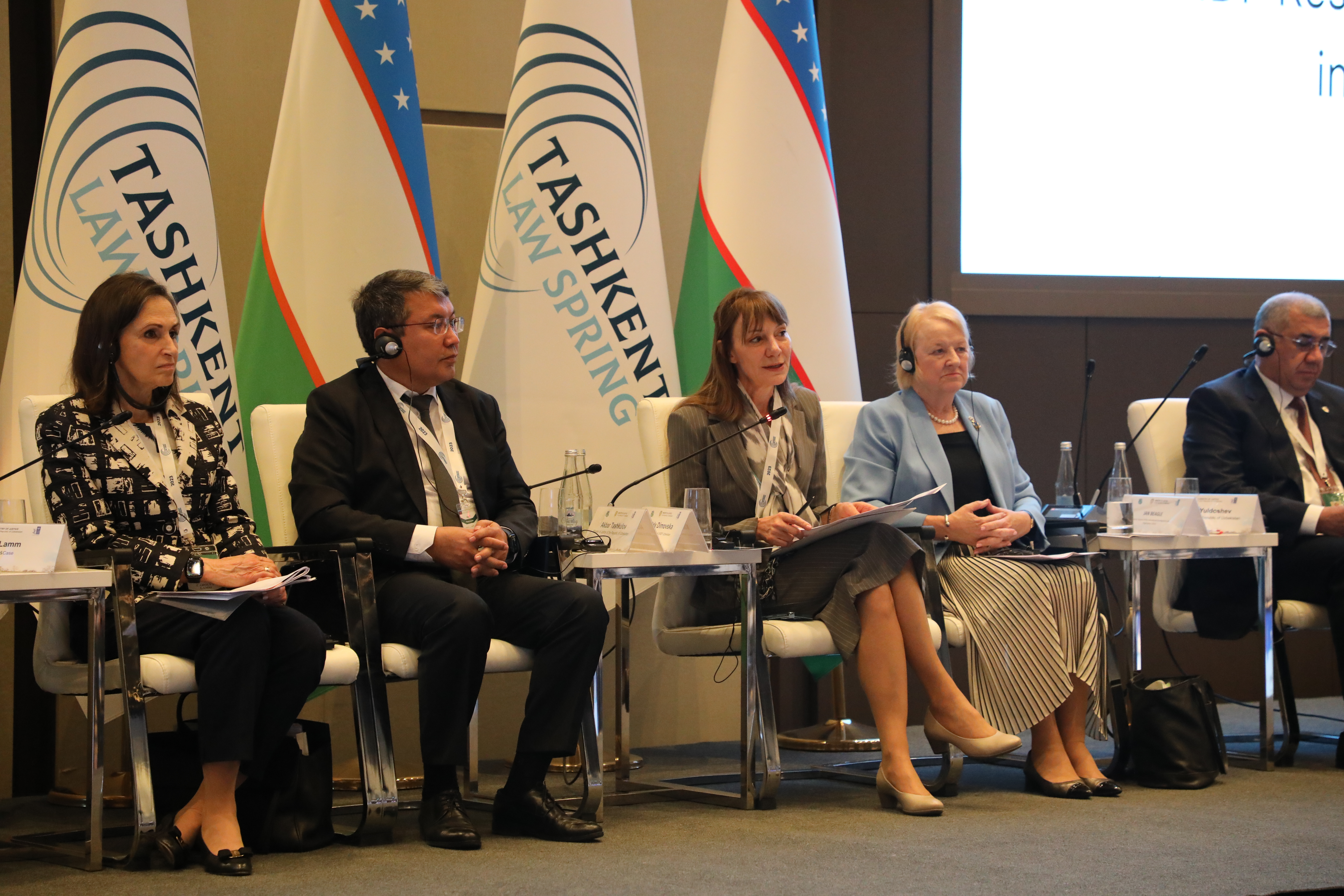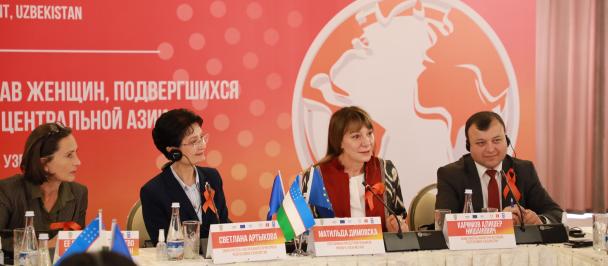Statement by Matilda Dimovska, Resident Representative, UNDP Uzbekistan at the plenary session of III Tashkent Law Spring: “Fundamental Rights as Eternal Values”
May 19, 2023

Hurmatli janob Tashkulov, janob Shanmugam,
Aziz mehmonlar (dear guests), hurmatli Forum ishtirokchilari,
Honimlar va janoblar (ladies and gentlemen), Assalomu alaykum.
It gives me great pleasure to again speak at this prominent biannual forum, which celebrates the rule of law, good governance, and access to justice in Uzbekistan.
We are particularly impressed with the topic of today’s Forum– Fundamental Rights as Eternal Values. And that the organizers plan to use the discussions for the sake of further improvement of the legal policy and ultimately to strengthen the rule of law in society, as well as ensure unconditional observance of citizens’ rights.
This is a topic of unconditional support from UNDP as well.
Because a safe, secure and stable society stands on a foundation created by shared values, the safeguarding of inclusion and civil society capacity, reliable governance and well-functioning institutions as well as high-quality legislation that safeguards fundamental and human rights.
Democracy and human rights are critical components of sustainable development and lasting peace, if not precondition for it.
Over 90 per cent of SDGs goals and targets correspond to human rights obligations. Fulfilling human rights obligations is not only the right thing to do but also it is a fundamental to achieving the SDGs. They are two sides of the same coin - as countries make progress on SDGs, they make progress on their human rights obligations. And vice versa.
The Agenda 2030, therefore, recognizes that inclusive and participative societies in which human rights are respected achieve better outcomes for all people, leaving no one behind. Using a human rights-based approach addresses the root causes of inequalities and drives forward progress on SDGs.
I will not spend much time on this broader understanding, as I believe we all share it. But I wish to make another point - about the changes in democracy, expectations and ways of delivering it, triggered by the world in which we live and which have to be considered.
We live in a fast-changing world with unprecedented developments and shifts, structural societal transformation. They all have an impact on the state of democracy and human rights as well as change people’s expectations and lead to the evolution of human rights.
For example, like never in recent history, the threat of the COVID-19 pandemic prompted many countries to limit human rights. Some 90 countries have taken actions to restrict freedom of expression during the pandemic. However, what we have learned is that human rights and principles like equality and non-discrimination need to be part of the solution. The bottom line is that all countries need to ensure that human rights are the heartbeat of any socio-economic recovery.
In 2021, the UN Human Rights Council recognised that having a clean, healthy, and sustainable environment is a global human right.
The other right that becomes increasingly important is access to affordable broadband internet, or avoiding of digital divide. Yet, remarkably, some 3.7 billion people remain “trapped” offline, with limited ability to have their say on vital issues. Indeed, many people are facing difficulty accessing basic services that are increasingly being digitized, negatively affecting their rights.
Recently, UNDP issued a Special Report on Human Security, which pointed to the issue of changing concerns and expectations of people. Basically, despite people on average living longer, healthier, and wealthier lives, these advances have not succeeded in increasing people’s sense of security. Perceptions of insecurity are worsening most in high-income countries, even before the Covid-19 pandemic.
People have good reason to feel insecure, with multiple threats from COVID-19, digital technology, climate change, biodiversity loss, and wars, which became more prominent or taken new forms in recent years. These are new realities and have to be reflected in the efforts to build equity and trust within societies – the core elements and indicators of democracy and respect for human rights.
All these lead to the key point that human rights and democracy have never been more relevant. We are at a critical moment, as people, where we must decide the kind of country we want to be, what values we hold most dear, and what kind of world we want to live in.
Uzbekistan is a signatory to and has ratified 10 out of 18 core UN human rights treaties and 17 ILO conventions.
The recent positive developments include ratification of the Convention of the Rights of People with Disabilities, abolishment of exit visa that improved the freedom of movement, and new status of the Ombuds institution which received status B from the Global Alliance of the National Human Rights Institutions; membership if the UN Human Rights Council, criminalization of violence against women and children. Or the introduction with the new Constitution of the right ‘to a favourable environment, reliable information about its condition’, with the state being responsible for its delivery.
Notwithstanding the progress in recent years, there are still many things to be done in terms of protecting human rights, curbing corruption, political freedoms, and access to justice in Uzbekistan. For example, Uzbekistan’s Global Freedom score is 12 out of 100 (comprising 2/40 for political rights and 10/60 for civil liberties). Some people in Uzbekistan, particularly the most vulnerable populations such as women, youth in rural areas, and people with disabilities, lack awareness about their rights or have limited access to justice remedies and services.
Therefore, there is big expectation and promise from the Development Strategy of New Uzbekistan - to bring democratic reforms to a new level. Among its priorities is building a state that cares about dignity, ensuring citizens’ interests and well-being, including based on the further development of a free civil society. It defines "100 goals in the name of human honour and dignity" in 7 priority areas. This is a very strong and relevant commitment for the years ahead.
Good governance, rule of law, and human rights are at the core of UNDP’s work in Uzbekistan. Together with the Ministry of Justice and other partners, we work on a number of issues:
- building an inclusive, human-centred and digitally empowered public service delivery system.
- transforming the system of local governance to make it efficient, transparent and responsive to the needs of people;
- curbing corruption and creating an integrity ecosystem in society;
- enhanced access to justice, especially in rural and remote areas.
As UNDP continues accompanying Uzbekistan in implementing its reforms, we argue that any effort to advance democracy and respect human rights will have to look into the current and future world, go beyond mere legislation and empower all segments of the society (being it male or female, old or young, living in rural or urban Uzbekistan) with the rights, choices and opportunities for the future, for them to have a fulfilling life and use their full potential.
Only as such the promise of building a strong “Human – Society – State” nexus, based on the principle of human honour and dignity, can be met.
E'tiboringiz uchun katta rahmat! (Thank you for your attention).
As UNDP continues accompanying Uzbekistan in implementing its reforms, we argue that any effort to advance democracy and respect for human rights will have to look into the current and future world, go beyond mere legislation and empower all segments of the society (being it male or female, old or young, living in rural or urban Uzbekistan) with the rights, choices and opportunities for the future, for them to have a fulfilling life and use their full potential.Matilda Dimovska, UNDP Uzbekistan Resident Representative

 Locations
Locations
